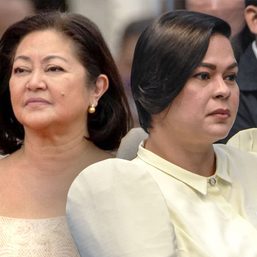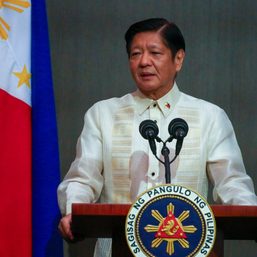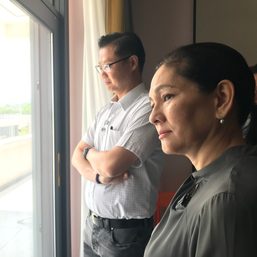SUMMARY
This is AI generated summarization, which may have errors. For context, always refer to the full article.

Senator Imee Marcos has sponsored a bill proposing a hybrid mode of conducting elections, which includes manually counting votes at poll precincts.
The proposed measure combines manual and automated modes of conducting elections. This, according to Marcos, would increase the transparency and security of elections.
Marcos, who heads the Senate committee on electoral reforms and people’s participation, brought before the Senate plenary on Monday, December 14, her panel’s report on Senate Bill (SB) No. 1950 or the Hybrid Election Bill.
This new bill consolidates earlier bills on hybrid polling filed by Marcos and Senate President Vicente Sotto III.
SB 1950 proposes the manual tallying of votes at the precinct level “to ensure that all vote counting is held in full public view, and is open to video recording and livestreaming for future fact-checking,” Marcos said.
In her sponsorship speech, Marcos highlighted speculations about the integrity and accuracy of fully automated elections.
“How do we know that our votes are counted correctly by a fully automated election system? We don’t,” Marcos said.
“Each step of the election process must be open to scrutiny. Since 2010, we have given too much importance to speed and convenience at the expense of transparency,” she added.
The senator then enumerated the controversies that came up in past automated elections: alleged early transmission of votes, foreign access to servers, installation of a “queuing server” and script change in the middle of transmission, and incomplete transmission of results.
Marcos’ brother, former senator Bongbong Marcos, has a pending electoral protest against Vice President Leni Robredo, who was elected in 2016.
The Commission on Elections (Comelec) and its equipment supplier Smartmatic explained at the time that these alleged irregularities did not affect the result of the elections. Changes done to the system midstream were “cosmetic” – that is, to improve on how the incoming data appeared on monitors, Smartmatic said.
The random manual audit (RMA) of the 2016 national and local elections yielded an accuracy rate of 99.88%. The RMA of the 2019 national and local elections registered an accuracy rate of 99.99% – the highest score since the country’s first automated elections in May 2010.
Still, Senator Marcos thinks fully automated elections cannot be trusted.
“The need for a random manual audit under the AES (automated election system) points to its lack of transparency in reading ballots. Manual vote counting will, at the very outset, ensure transparency and the security of our votes,” Marcos said.
Back to ‘dagdag-bawas’?
Bills on switching to hybrid elections were first filed in mid-2019 but were overtaken on the Senate floor by more pressing measures to address the COVID-19 pandemic, such as the Bayanihan laws.
On October 22, during a hearing of the Comelec’s proposed budget for 2021, chairperson Sheriff Abas said the poll body would be unable to conduct hybrid elections in May 2022 if the requisite law is not passed by January 2021.
The Comelec is already well into preparing for the 2022 national and local polls, and it would be too late to switch modes if the law to authorize it comes any later than January.
On Sunday, December 13, the Inquirer reported that Marcos allegedly tried to insert a provision in the 2021 national budget bill allowing the Comelec to waive safeguards on the procurement of equipment and software for elections.
Other senators opposed this and had the provision stricken from the final version of the budget bill, which Congress ratified last Wednesday, December 9. The senators have not identified who was behind that provision.
The Automated Election Law mandates a stringent process of procuring and certifying the technology to be used in elections. These include open public biddings, testing of hardware and software by multiple parties, and certification of the source code or main script of the technology by an international group.
It is a lengthy process that is initiated more than a year prior to an election. If the provision to waive procurement safeguards had been retained in the 2021 budget bill, it would have allowed the Comelec to take shortcuts in procuring equipment and software ahead of the 2022 elections.
Switching to hybrid elections will likely require the replacement of the technology used in the previous elections, which were fully automated.
During her speech on Monday, Marcos said new, more trustworthy technologies must be developed, preferably by Filipinos, to make their elections truly their own.
Automated elections were considered a breakthrough when the Philippines first conducted them in May 2010. Before that, elections were marred by allegations of massive fraud, such as the election of President Gloria Macapagal Arroyo in May 2004.
Prior to automation, Philippine elections were notorious for the “dagdag-bawas” or “add-subtract” scheme – shaving votes off the tally of a candidate and transferring them to another’s.
“If we were to regress to the fraud-prone manual system this 2022, anyone who will run in opposition to the government will never have the fighting chance,” tweeted election lawyer Emil Marañon III, who first exposed the attempt to waive procurement safeguards on polling equipment, without revealing the author of the provision.
“This is how crucial this is,” Marañon said of the push for hybrid elections. – Rappler.com
Add a comment
How does this make you feel?
![[EXPLAINER] Hybrid elections: Costlier, time-consuming, error-prone](https://www.rappler.com/tachyon/2020/12/tl-hybrid-system-December-3-2020-1.jpg?fit=449%2C449)
![[OPINION] If it’s Tuesday it must be Belgium – travels make over the Marcos image](https://www.rappler.com/tachyon/2024/04/tl-travel-makeovers-marcos-image.jpg?resize=257%2C257&crop_strategy=attention)









There are no comments yet. Add your comment to start the conversation.